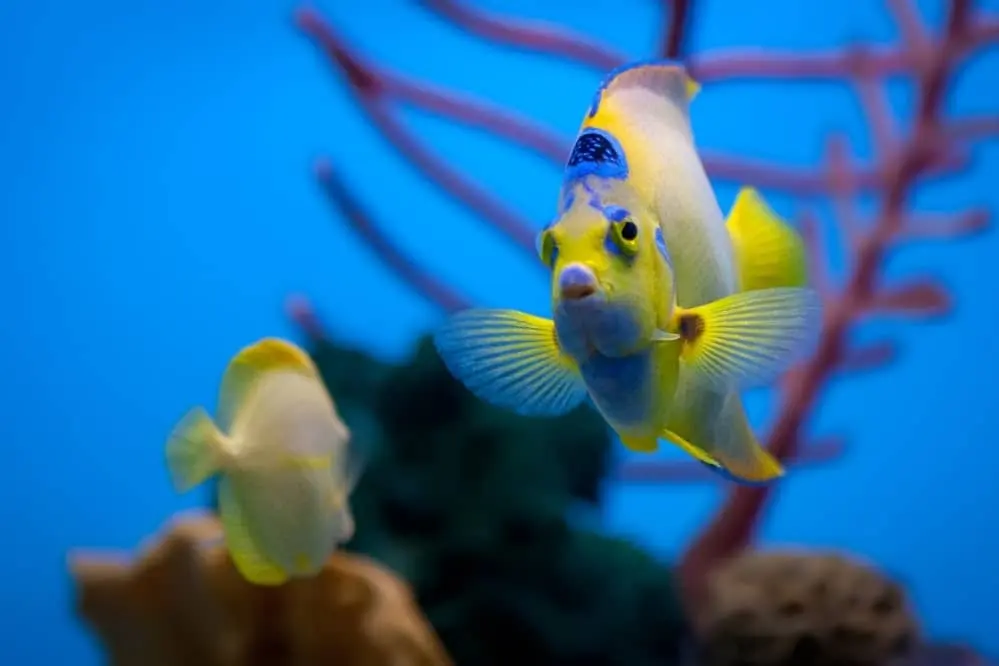How to Tell If Your Pet Fish is Dying?

Like any other pet, owning fish is a responsibility, and a part of this responsibility is making sure that they are healthy. However, fish can and do get sick.
That said, just because your fish is sick does not necessarily mean that it is going to die, at least not if you get it the proper treatment it needs.
This article will cover a full range of symptoms that may indicate that your fish is sick or dying. If you catch the signs early enough, the prognosis may be good − but it is all about catching it as early as possible.
A Lack of Appetite
One of the signs that your pet fish may be in trouble is a lack of appetite. One of the few things that fish do is eat, and they need to eat to survive. Just like humans, fish need calories and nutrients to grow and to maintain their bodily functions.
If you notice a lack of appetite, it could be a sign that your fish is ill. There are various bacterial infections, parasites, and other diseases that can cause fish to lose their appetites.
Moreover, this is quite the vicious cycle because if a fish is sick, it needs every calorie it can get to heal itself, but because it’s sick, it won’t eat, which will only make matters worse.
However, if you have a new fish and it won’t eat, give it a couple days, as it might just be getting used to its new surroundings. If it doesn’t eat after a couple of days, try switching foods.
A lack of appetite or eating doesn’t always mean that a fish is sick, but it certainly can. Sometimes fish might just not like the food you are providing them.
Respiratory Distress
Another sign that your fish may be dying is if it is experiencing respiratory distress. Most fish will respirate or move their gills anywhere between 20 and 80 times per minute. If you notice a decrease in your fish’s respiratory rate, it could mean trouble breathing.
However, worse than this is if you notice that your fish’s respiratory rate is too high. If your fish is breathing too fast, it’s a sign they’re not getting enough oxygen.
If this is the case, try oxygenating the water better with something like an air stone. If your fish is not getting enough oxygen, you may also notice it swimming to the surface to gasp for air.
Some diseases and infections can cause respiratory issues in fish, and of course, a lack of dissolved oxygen in the water may be to blame. Either way, if your fish is not getting enough oxygen, it’s only a matter of time till they die.
Decreased Energy and Swimming Activity
Another sign of disease is if your fish no longer swims around or lacks energy. This will depend on the fish, as many species, particularly bottom dwellers, don’t move much to begin with.
Some fish like to just hang out on the substrate without moving much. However, if you have a usually energetic fish that usually swims around the tank, but all of a sudden starts swimming much slower, or even just floating in place, it’s a sign that something is wrong.
Several bacterial and parasitic infections and other diseases can affect a fish’s ability to swim and its energy levels. If your normally active fish stops being active, then it’s time to seek help.
This issue can also go the other way. Normally calm and peaceful fish may become overly active and start darting around the aquarium, almost like they are running from something.
Although this is usually not a sign that your fish is dying, it is a sign that your fish is unhappy or stressed out, often due to aggressive tankmates. This stress can make them vulnerable to disease, which can then lead to death.
Decreased Coloration
Yet another sign that your fish may be ill or dying is if you notice its color fading. When they get very old or sick, fish that are generally very bright and colorful tend to lose their color. Sometimes, this decrease in color can be very drastic.
Depending on the type of sickness, a reddish-orange goldfish may lose its color to the point where it is pale yellow or almost white. This is an indication that something is very wrong with your fish.
Physical Symptoms of Disease
You should always look for physical symptoms of illness in your fish. There are many diseases and infections that fish can suffer from, like pop-eye, dropsy, ich, and many others; each has some distinct symptoms. Below is a list of physical symptoms that usually accompany a variety of fish diseases. Be aware that all these illnesses can be fatal.
- A common illness that can affect many aquarium fish is called exophthalmia, also known as pop-eye. The most common symptom of this disease is bulging eyes (it can affect one or both eyes). You may even notice a bubble-like protrusion covering the eyes.
- If you notice that your fish’s tail and fins are tattered, ragged, discolored, and shortened, it is a clear indication that your fish is suffering from fin rot or tail rot.
- If you notice that your fish has raised scales, almost like pinecones, along with a bloated belly, it is a strong indication that your fish is suffering from dropsy.
- Another common disease that fish can develop is septicemia, with common symptoms being the appearance of red or bloody streaks across the body, lethargy, bloating, ulcers, gasping for air, and clamped fins.
- If you notice that your fish has open sores, grey lesions, raised scales, fin or tail rot, and/or body deformities, it may be a sign that your fish has tuberculosis. Be aware that tuberculosis, a very deadly disease, can be transferred from fish to humans, so take great care if you suspect that this illness is to blame for your fish’s poor condition.
Conclusion
The bottom line is that if you notice that your fish is suffering from any of the above symptoms, then it is time to seek immediate medical attention. Fish are relatively fragile, so chances are that if you do nothing, the result will be the death of your pet fish.




0 Comments